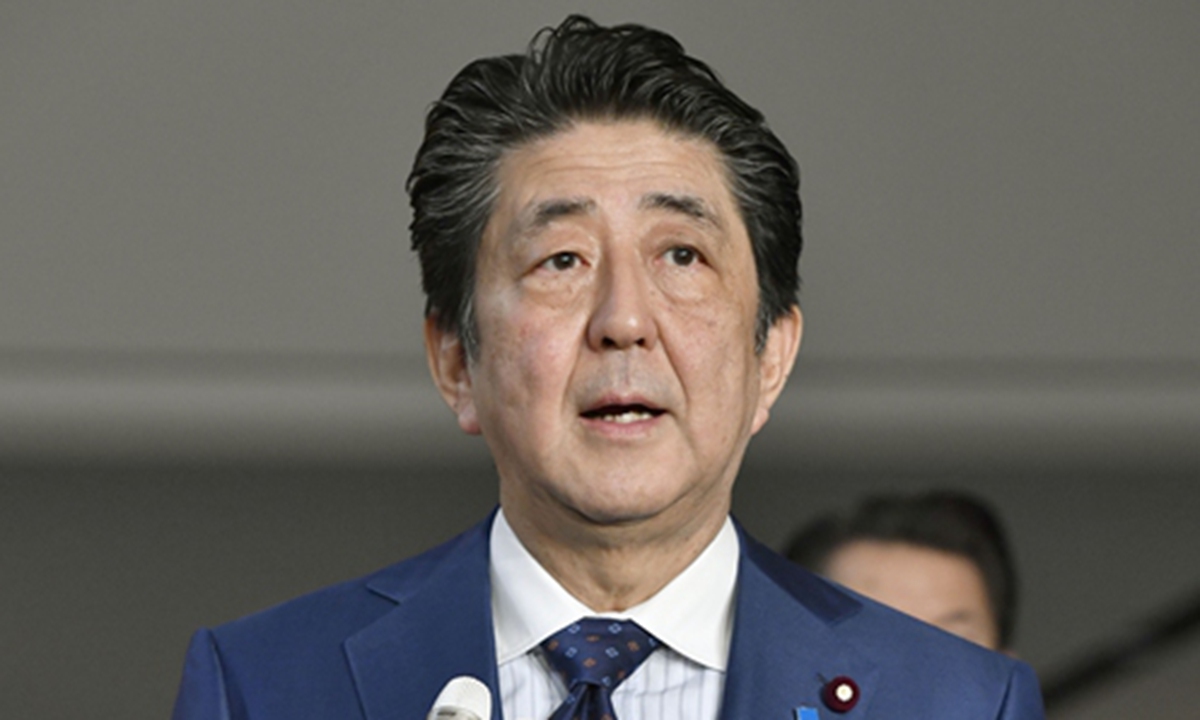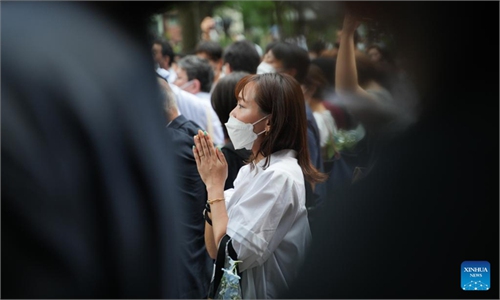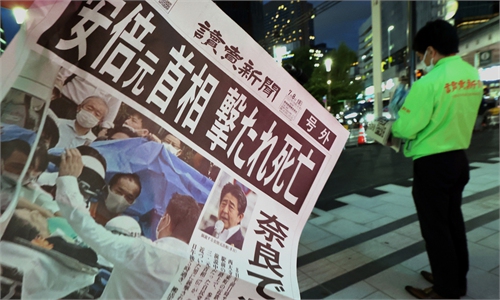Abe’s death exposes long-neglected collusion between politicians and Unification Church in Japan, South Korea

Japanese Prime Minister Shinzo Abe Photo: IC
More details about the assassination of former Japanese prime minister Shinzo Abe were revealed to the public as of Thursday, and the motivation of the killer Tetsuya Yamagami exposed an "open secret" of Japanese politics — the collusion between some Japanese right-wing figures and a South Korea-originated cult.
Politicians and extreme religious groups in some countries have formed a backscratching relationship, from which both parties yield benefits, while ordinary people who were deceived by the cults suffered , anti-cult experts pointed out.
After the shooter was arrested, he claimed that the assassination was because of Abe's connection to the Family Federation for World Peace and Unification, known as the Unification Church, a religious group founded in South Korea, which had been identified as a cult in China.
According to Japanese media reports on Thursday, the suspect Yamagami originally planned to kill the current head of the cult, but changed his target when the head stopped going to Japan due to the COVID-19 pandemic.
The suspect abandoned a plan to go to South Korea to assassinate the cult head as he thought he "couldn't leave the country [Japan]," media said.
Yamagami's hatred of the religious group increased after his mother donated more than 100 million yen ($720,000) to the Unification Church, according to a report by the Asahi Shimbun on Thursday.
The donation included 50 million yen the suspect's mother received from a life insurance policy on her husband, as well as proceeds from property sales, the Asahi Shimbun cited a source as saying. She was declared bankrupt in 2002.
Notebooks seized from the homes of the suspect and his mother contained jottings by Yamagami complaining about his mother and the religious group, the sources said. Yamagami told investigators that his mother's large donations drove the family into financial ruin.
The head of the Japanese branch of the Unification Church, often known as the Moonies, told a news conference in Tokyo on Monday that Yamagami's mother is a member of the religious group but did not reveal details of her donations that may be connected to the motivation behind the shooting.
Kyodo News reported on Thursday that the suspect has confessed to police that he originally made a pressure cooker bomb but decided to make a gun because a bomb could hurt others.
The assassination has put ties between the cult and Japanese politicians under a spotlight.
Kimiaki Nishida, an expert on cult psychology at Rissho University, told the Financial Times the Japanese establishment and media had long turned a blind eye to political links to Moonies. "This is not a religious group but a cult that is hungry for money. But no one touched the issue," the expert said.
Looking back on the history of the Unification Church, people have seen the specter of an extremist religious group looming over the political arena of Japan, South Korea, and even the US.
In the mid-1960s, Abe's maternal grandfather and former Japanese prime minister, Nobusuke Kishi, would never have imagined that his association with Moon Sun-myung, the founder of the Unification Church, would sow the seeds that eventually led to the death of his grandson.
On the afternoon of August 22, 2013, three Japanese believers set themselves on fire in Gyeonggi Province, South Korea, causing serious consequences of one person dying on the spot and two others being seriously injured, media reports said.
A Chinese anti-cult expert, who required anonymity, told the Global Times on Thursday that the Unification Church makes money by asking for donations from its believers by pretending to communicate with their dead family members.
A Japanese court recently awarded more than $150 million in compensation for harm to thousands of Japanese people who sued the religious group, the Washington Post reported on July 12.
Why has the extreme religious group survived for decades? The Chinese expert pointed out that political figures in the US, Japan and South Korea have served as the group's protection umbrella.
Close ties between Japan's ruling Liberal Democratic Party and the religious group were consolidated through political election campaigns, the expert said.
For politicians, they can win more support by colluding with such religious groups, as the cult believers can become their voters. Also, most of the cults have their channels for preaching through which politicians can promote their political views, according to the anti-cult expert. For the cult, it can promote itself, expand its influence and further attract believers, the expert said.
The backscratching relationship has made the local mainstream media and the authorities in those countries turn a blind eye to the hazards of the cult, the expert said.
The collusion between politicians and the cult has been an open secret in Japanese politics. How long before they acknowledge the elephant in the room and deal with it? This is a question that remains to be answered.



